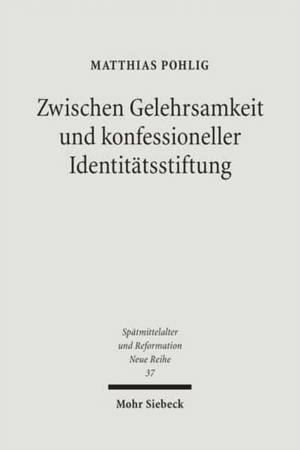
- Retrait gratuit dans votre magasin Club
- 7.000.000 titres dans notre catalogue
- Payer en toute sécurité
- Toujours un magasin près de chez vous
- Retrait gratuit dans votre magasin Club
- 7.000.0000 titres dans notre catalogue
- Payer en toute sécurité
- Toujours un magasin près de chez vous
Zwischen Gelehrsamkeit Und Konfessioneller Identitatsstiftung
Lutherische Kirchen- Und Universalgeschichtsschreibung 1546-1617
Matthias Pohlig
Livre relié | Allemand | Spätmittelalter, Humanismus, Reformation / Studies in the Late Middle Ages, Humanism and the Reformation / SMHR | n° 37
146,45 €
+ 292 points
Description
English summary: How did advocates of early Lutheranism establish the historical location of the Reformation? What was the connection between the historiography of Lutheranism and its denominational identity? Matthias Pohlig studies the question of the patterns of argumentation of a Lutheran memory with the objective of constructing an identity and the question of the relationship between this memory and 16th century historiography and the theory of history. Lutheran historiography is based on basic assumptions, which are shared by many, regarding the significance of the Reformation for the history of salvation, the pontifical Antichrist, the esteem in which the German emperors were held as well as basic prophetic-biblical principles. The author shows how history has presented us with two types of Lutheran identity: the memory which is geared to the eschatological figure of Luther and the placing of the Reformation into a larger context. German description: Wie bestimmten Vertreter des fruhen Luthertums den historischen Ort der Reformation? Wie hing die Geschichtsschreibung des Luthertums mit seiner konfessionellen Identitat zusammen? Matthias Pohlig untersucht die Frage nach Argumentationsmustern eines lutherischen Gedachtnisses zum Zwecke der Identitatskonstruktion und die Frage nach dem Verhaltnis dieses Gedachtnisses zur Geschichtsschreibung und -theorie des 16. Jahrhunderts. Lutherische Autoren wiesen der Geschichte unterschiedliche Funktionen zu: die aus dem Humanismus ubernommene Uberzeugung, die Geschichte lehre Moral, dann die Auffassung, die Geschichte laufe entsprechend den biblischen Prophetien ab. Zentral war fur lutherische Autoren die Auffassung, dass ihre Kirche nicht neu, sondern die alte, wahre Kirche sei. Neben diese konfessionell funktionalisierten Aufgaben trat eine Beschaftigung mit der Historie zu Bildungszwecken. Die lutherische Geschichtsschreibung des 16. Jahrhunderts fand damit in einem Spannungsfeld von Gruppengedachtnis und relativ uninstrumenteller Gelehrsamkeit statt. Die lutherische Historiographie beruhte auf weithin geteilten Grundannahmen uber die heilsgeschichtliche Bedeutung der Reformation, den papstlichen Antichrist, die Hochschatzung der deutschen Kaiser sowie uber prophetisch-biblizistische Grundlagen. Der Autor arbeitet zwei Arten lutherischer Identitat im Medium der Geschichte heraus: die auf die endzeitliche Figur Luther konzentrierte Memoria und die Einordnung der Reformation in einen grosseren Zusammenhang.
Spécifications
Parties prenantes
- Auteur(s) :
- Editeur:
Contenu
- Nombre de pages :
- 589
- Langue:
- Allemand
- Collection :
- Tome:
- n° 37
Caractéristiques
- EAN:
- 9783161491917
- Date de parution :
- 01-06-07
- Format:
- Livre relié
- Format numérique:
- Genaaid
- Dimensions :
- 179 mm x 250 mm
- Poids :
- 1028 g

Les avis
Nous publions uniquement les avis qui respectent les conditions requises. Consultez nos conditions pour les avis.






